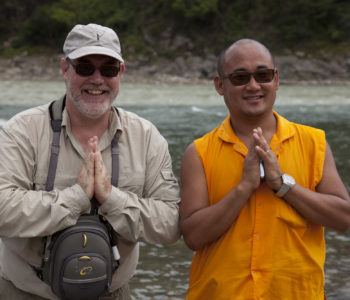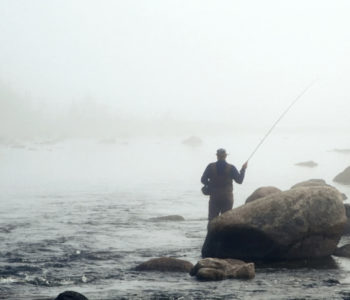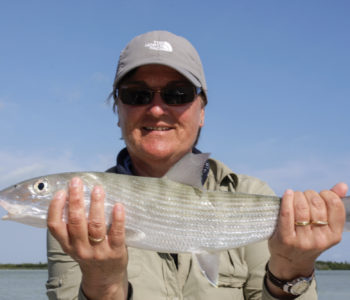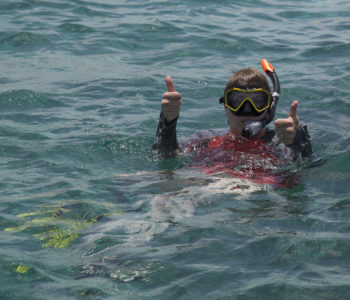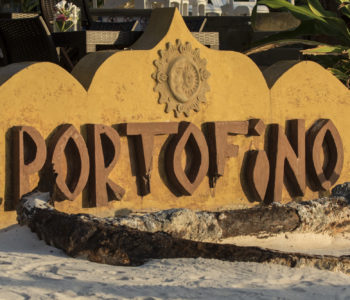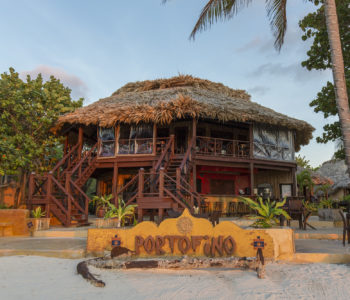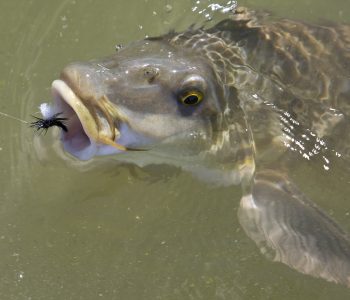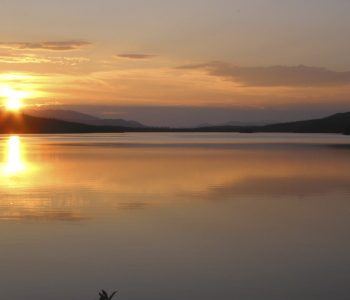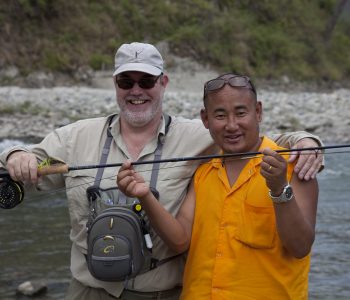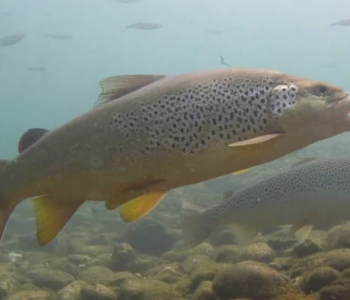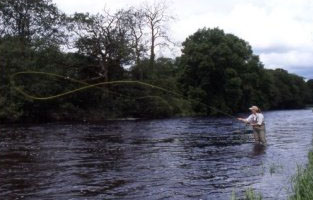
Let’s go fishing – with Glenda Powell
Salmon – Feminine Style
Two French journalists travel to Ireland to visit the Cork Blackwater and meet a unique fisherwoman. Article written by Olivier Plasseraud (editor – Salmo magazine) & translated by Ian Powell from the French original. Photos by Marc Delacoste (assistant editor – Salmo magazine).
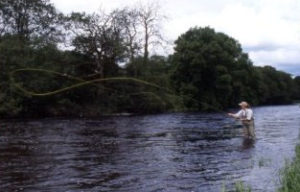 To see a fisherman perfectly mastering a double-handed fly rod is rare enough. When the fisherman turns out to be a woman, we are in the realm of the exceptional. It was on the banks of the river Blackwater in southeast Ireland that we met Glenda Powell. She teaches the art of salmon fishing with talent.
To see a fisherman perfectly mastering a double-handed fly rod is rare enough. When the fisherman turns out to be a woman, we are in the realm of the exceptional. It was on the banks of the river Blackwater in southeast Ireland that we met Glenda Powell. She teaches the art of salmon fishing with talent.
Portrait
Northern Irish – Glenda grew up in the suburbs of Belfast. A place where you learn quickly not to let others walk all over you. Her uncle was the best fisherman in the family. She was only nine years old when he died and left her a precious legacy – all his fishing tackle. Under the amused gaze of her three sisters and other boys of her age, she decided – with a determination well beyond her nine years – to learn to use it by herself. Not easy by any means, but more a question of pride. Within a few years, many Northern Irish trout had paid the ultimate tribute to her ability with the worm and then the fly rod. Even as an adolescent, she knew that fishing would be the focal point of her existence.
At the tender age of eighteen years, she left home to settle in Scotland as a 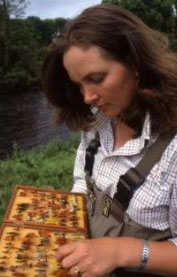 salmon fishing ghillie, an essentially male dominated profession in which she nevertheless succeeded admirably. In a short while, she found herself selected to fish for the Scottish International Ladies Fly fishing team. On returning to Ireland a couple of years later, she was appointed as manager of the Irish Ladies team. Writing is another of her talents, and in 1997 she came to the Blackwater Lodge to write a magazine article on the world-famous Lodge and salmon fishing. She met the owner – Ian Powell – fell in love with him and his river, and has never left. They are now happily married with two small children.
salmon fishing ghillie, an essentially male dominated profession in which she nevertheless succeeded admirably. In a short while, she found herself selected to fish for the Scottish International Ladies Fly fishing team. On returning to Ireland a couple of years later, she was appointed as manager of the Irish Ladies team. Writing is another of her talents, and in 1997 she came to the Blackwater Lodge to write a magazine article on the world-famous Lodge and salmon fishing. She met the owner – Ian Powell – fell in love with him and his river, and has never left. They are now happily married with two small children.
Good, and now ……….Do we go fly-fishing or would you prefer that we go and catch a salmon? Glenda’s question is clear. The fly is beautiful, and she has just given us a superb demonstration. Single Spey or double, roll cast, snake roll and other subtle variations on the theme of double handed fly-casting, she executes them all gracefully. But the Blackwater is running bank high and the water’s colour lives up to its name. Not much hope with a fly rod in these conditions. For the worm, on the other hand, the conditions are good.
Glenda loves to fly fish above all, but it doesn’t take long to understand that she is above all – a true fisher (person!), one of a breed who believes that fishing is for catching fish with the method best suited to the prevailing conditions. To take a fish herself when she fishes alone, or to help her clients take a fish when she is ghillying – is the defining objective. And she loves her job! After numerous seasons have passed working seven days per week as ghillie or casting instructor, Glenda knows what she is talking about. For the British, for whom the history of professional ghillies in leisure fishing is longer than anywhere else, the tasks are well defined! The ghillie’s work is one thing; the fishing instructor’s is another. The role of the ghillie is to put his fishing clients in the right place and to suggest to them the tackle and techniques to take a fish. It’s a specialised job in England, Wales, Scotland and Ireland, and Glenda even runs training courses for aspiring ghillies too.
 But her preference is to teach fishing and fly casting, to teach her clients the basics of double handed fly casting or to correct the bad habits of the more experienced anglers (we all have them!). She loves teaching fishing. “I prefer teaching individuals or small groups. The most important factor is not to stress the clients. A beginner must feel at ease. Before he picks up the rod, I always start by explaining what he will have to do – how and why. Always in plain English. I demonstrate how it should be done, and break it down into the important steps. The pupil must see the correct movements – his goal is to emulate them. Then, before he starts to fish, I point out the stages which could cause problems. It’s easier to avoid an impasse if the pupil is aware of the difficulty”.
But her preference is to teach fishing and fly casting, to teach her clients the basics of double handed fly casting or to correct the bad habits of the more experienced anglers (we all have them!). She loves teaching fishing. “I prefer teaching individuals or small groups. The most important factor is not to stress the clients. A beginner must feel at ease. Before he picks up the rod, I always start by explaining what he will have to do – how and why. Always in plain English. I demonstrate how it should be done, and break it down into the important steps. The pupil must see the correct movements – his goal is to emulate them. Then, before he starts to fish, I point out the stages which could cause problems. It’s easier to avoid an impasse if the pupil is aware of the difficulty”.
For Glenda, this psychological aspect is very important.
“It’s no good drowning the pupil with details, but to bring out the essential points. If he has problems with a particularly difficult movement, I don’t insist. We go on to something else, less difficult, but in any case different. When he has regained his confidence or changed his ideas, we go back to it – and things invariably go better”.
Consequently, even during a fly fishing lesson, she won’t hesitate to suggest a couple of runs with the worms or a few casts with a spinner, just to put him at ease.
“I’m not a fly fishing purist. I love fishing worms in particular. To fish them with the right weight & speed down the right line isn’t so easy. Then – the sensation of the salmon taking the worms whilst we give him line – the suspense is much more prolonged than a pull on the fly or a hard hit on the spinner”.
I watched Glenda fishing with worms. She knows exactly what she’s talking about.
In fishing, a woman’s place is always marginal.
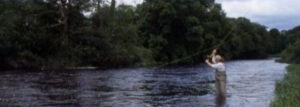
In spite of a competence and experience of Atlantic salmon fishing that few people of her age possess, we could well ask if the fact of being a woman isn’t a handicap in her chosen profession.
“Of course, some men don’t like the idea of learning to fish from a woman. But they are few and far between and, overall, I think it’s positive for the learning process. Advice is often better accepted by a man from a woman than from another man. Not getting blocked, vexed or stressed is undoubtedly easier. Not withstanding, a woman doesn’t have the right to make a mistake. Much more than a man, she must strive for excellence to remain credible.
As for female pupils, they are still few and far between in Glenda’s clientele. But her observations paint an interesting portrait of the fisherwoman.
“A woman who fishes is rarely average. If she does so solely to please her man, without real motivation, she’s a lost cause. At best, she will remain mediocre, and progress little with time. On the other hand, if she fishes for herself with a real passion, then she will probably be extremely good. To persevere in this predominantly macho sport where women are at best tolerated, necessitates an approach & motivation which permits her to progress above the level of the normal fisherman.
The Spey-casting Myth
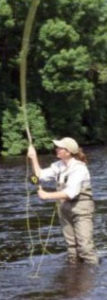 Teaching and perfecting the use of a double-handed rod are Glenda’s speciality: “There is a myth surrounding the Spey cast. Many fishermen who master the use of a single-handed rod for conventional casting have a complex about spey-casting. It’s true that to learn the spey-cast is complicated by the habits of casting single-handed. Generally, the right-handed fisherman who picks up the double-handed rod completely underestimates the role of the left hand. He imagines that it only serves to support the rod, which requires two hands purely because it is longer and heavier. In fact, it’s the scissor movement between the two hands that gives all the power to the cast. Until this manipulation is mastered, it is impossible to cast correctly. The rest in simply a variation of a roll cast. When a pupil already knows how to do this with a single-handed rod, they already feel more at ease”. Glenda has some memorable moments in her time as a casting instructor of which she is particularly proud. The story of the sturdy man, who in spite of being a keen fisherman, had given up after trying for years to spey-cast properly. After 20 minutes of teaching, he was casting right across the river. Tears of relief flowed down his cheeks as the frustration of so many years trying in vain evaporated. Two days later, a large bouquet of flowers arrived for her with the message “I’ve always been in the dark with my spey-casting – thank you for showing me the light”. Then there was the story of the guy who caught his first salmon on fly with her on the Blackwater after fifteen years of trying in Scotland, Norway & elsewhere. But her favorite tale is the one about the Royal Air Force veteran with two wooden legs as his were blown off in the Second World War. At the tender age of 86, he caught his first ever salmon on his second day fishing with her.
Teaching and perfecting the use of a double-handed rod are Glenda’s speciality: “There is a myth surrounding the Spey cast. Many fishermen who master the use of a single-handed rod for conventional casting have a complex about spey-casting. It’s true that to learn the spey-cast is complicated by the habits of casting single-handed. Generally, the right-handed fisherman who picks up the double-handed rod completely underestimates the role of the left hand. He imagines that it only serves to support the rod, which requires two hands purely because it is longer and heavier. In fact, it’s the scissor movement between the two hands that gives all the power to the cast. Until this manipulation is mastered, it is impossible to cast correctly. The rest in simply a variation of a roll cast. When a pupil already knows how to do this with a single-handed rod, they already feel more at ease”. Glenda has some memorable moments in her time as a casting instructor of which she is particularly proud. The story of the sturdy man, who in spite of being a keen fisherman, had given up after trying for years to spey-cast properly. After 20 minutes of teaching, he was casting right across the river. Tears of relief flowed down his cheeks as the frustration of so many years trying in vain evaporated. Two days later, a large bouquet of flowers arrived for her with the message “I’ve always been in the dark with my spey-casting – thank you for showing me the light”. Then there was the story of the guy who caught his first salmon on fly with her on the Blackwater after fifteen years of trying in Scotland, Norway & elsewhere. But her favorite tale is the one about the Royal Air Force veteran with two wooden legs as his were blown off in the Second World War. At the tender age of 86, he caught his first ever salmon on his second day fishing with her.
Indulging one’s passion throughout the seasons on a magnificent salmon river, it’s the little boy’s dream that still haunts many a fisherman.
In a Belfast suburb, a little girl had the same dream……..
Fact File
For information on salmon fishing and tuition
on the Cork Blackwater contact:
Glenda Powell
Blackwater Lodge Hotel & Salmon Fishery
Upper Ballyduff
Co. Waterford
Ireland
Tel: 00 353 58 60235
Fax: 00 353 58 60162
Email: info@ireland-salmon-fishing.net
Web: www.ireland-salmon-fishing.net
